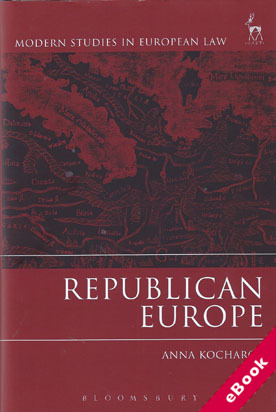
The device(s) you use to access the eBook content must be authorized with an Adobe ID before you download the product otherwise it will fail to register correctly.
For further information see https://www.wildy.com/ebook-formats
Once the order is confirmed an automated e-mail will be sent to you to allow you to download the eBook.
All eBooks are supplied firm sale and cannot be returned. If you believe there is a fault with your eBook then contact us on ebooks@wildy.com and we will help in resolving the issue. This does not affect your statutory rights.
Constitutional orders constitute political communities - and international orders deriving from them - by managing conflicts that threaten peace.
This book explores how a European political community can be advanced through EU constitutional law. The constitutional role of the Union is to ensure peace by addressing two types of conflict. The first are static conflicts of interests between the national polities in the EU.
These are avoided by ensuring reciprocal non-interference between Member States in the Union through deregulation in Union law. The second are dynamic conflicts of ideas about positive liberty held by the peoples of Europe that can be resolved through regulation in a European political space. Here, EU law enables a continuous process of re-negotiating a shared European idea of positive liberty that can be accepted as own by each national polity in the EU. These solutions to the two types of conflicts correspond to the liberal and republican models for Europe.
The claim of this book is that the constitutional design of Europe presents both liberal and republican features. Taking a hugely innovative approach, which draws on arguments from substantive law, constitutional theory, case law analysis, insights from psychology and philosophy, it identifies how best to strengthen the Union through constitutional law.